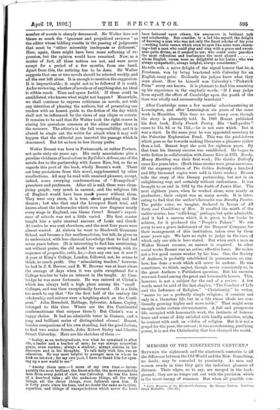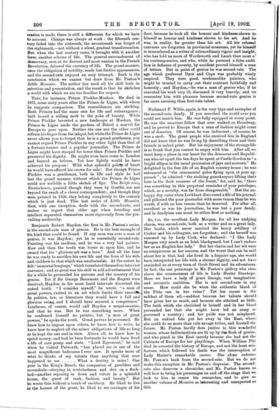MEMOIRS OF THE NINETEENTH CENTURY.* BETWEEN the eighteenth and the
nineteenth centuries is all the difference between the Old World and the New. Something, no doubt, may be conceded to proximity. As men and women recede in time they gain the indistinct glamour of distance. Their edges, so to say, are merged in the back- ground ; they are no longer cut out with the precision which is the worst enemy of romance. But when all possible con-
• Little Memoirs of the Nineteenth Century. By George Poston. London Grant Richards. [10s. 6d.] cession is made, there is still a difference for which we have to account. Change was always at work : the fifteenth cen- tury faded into the sixteenth, the seventeenth was forgot of the eighteenth,—not without a silent, gradual transformation. But when the last century came, it brought with it another form, another scheme of life. The general encroachment of democracy, seen at its fiercest and most wanton in the French Revolution, debased the currency of life. The grand manner, once the obligation of nobility, made but furtive appearances, and the second-rate enjoyed an easy triumph. Such is the conclusion which we cannot but draw from Mr. Paston's Little Memoirs. The author has used all his skill both in selection and presentation, and the result is that he sketches a world with which we are too familiar for respect.
Take, for instance, Prince Piickler-Muskau. He died in 1871, some sixty years after the Prince de Ligne, with whom he suggests comparison. The resemblances are striking. Both Princes had the same zest for life and extravagance ; both bowed a willing neck to the yoke of beauty. While Prince Piickler invented a new landscape at Muskau, the Prince de Ligne made the gardens of Belceil a marvel for Europe to gaze upon. Neither the one nor the other could refrain his finger from the inkpot,but while the Prince de Ligne never allows you to forget that he is a grand gentleman, you cannot regard Prince Piickler in any other light than that of a fortune-hunter and a popular journalist. The Prince de Ligne might have stooped far lower than Prince Piickler and preserved his dignity. He might even have come to London and hunted an heiress. Yet how lightly would he have achieved his purpose ! With what splendid gaiety of heart he would have offered his crown for sale! But though Prince Piickler was a gentleman, both in life and style he had lost the grand manner, without which the Prince de Ligne could not scribble a little sketch of Spa. The Briefe eines Verstorbenen, praised though they were by Goethe, are not beyond the reach of a clever correspondent ; and though they were printed in 1826, they belong completely to the century which is just dead. This last series of Little Memoirs, then, with one exception, dears with the second-rate, and makes us regret that older age when breeding and intellect separated themselves more rigorously from the pre- vailing mediocrity.
Benjamin Robert Haydon, the first in Mr. Paston's series, is the second-rate man of genius. He is the best example of his kind that could be found. If any man was ever a man of genius, it was Haydon; yet he is essentially second-rate. Tainting was his medium, and he was a very bad painter. Now and then the truth was borne in upon him, and he owned that his " glorious art was a bore." And all the time he was ready to sacrifice his own life and the lives of his wife and children to that which was unattainable. At the outset he felt" immortal longings," which translated themselves into vast canvases; and so great was his skill in self-advertisement that for a while he persuaded his patrons and the country of his genius. Yet if Sir George Beaumont and the Regent were deceived, Haydon in his most lucid intervals discerned the naked truth. " I consider myself," he wrote, " a man of great powers, excited to an art which limits their exerci In politics, law, or literature they would have a full and glorious swing, and I should have secured a competence." Lombroso, of course, would call Haydon a megalomaniac, and that he was. But he was something more. When he confessed himself no painter, but "a man of great powers," he spoke the truth. Great powers he possessed. He knew bow to impose upon others, he knew how to write, he knew how to neglect all the minor obligations of life so long as be kept the one end in view. Above all, be knew how to spend money, and had he been fortunate he would have lived a life of rare pomp and state. "Lord Egremont," he said when he visited Petworth, " has placed me in one of the most magnificent bedrooms I ever saw. It speaks more of what he thinks of my talents than anything that ever happened to me What a destiny is mine ! One year in the King's Bench, the companion of gamblers and scoundrels—sleeping in wretchedness and dirt on a flock- bed—another reposing in down and velvet in a splendid house, the guest of rank, fashion, and beauty." But he wrote this without a touch of snobbery. He liked to live in the houses of the great, he liked to see carriages at his
door, because he took all the honour and kindness shown to. himself as honour and kindness shown to his art. And he was, in reality, far greater than his art. All his colossal canvases are forgotten in provincial museums, yet he himself is remembered as a writer of extraordinary vigour and insight,. who has told us more of Wordsworth and Lamb than most o' his contemporaries, and who, while he pursued a false ambi• tion in defiance of poverty, by accident proved himself a man of letters. But in point of genius he was second-rate. The age which preferred Dyce and Cope was probably wisely inspired. They were good, workmanlike painters, who might be trusted to carry out their contract faithfully and honestly; and Haydon,—he was a man of genius who, if he executed his work very ill, discussed it very bravely, and we remember him with pleasure because second-rate genius is far more amusing than first-rate talent.
Nathaniel P. Willis, again, is the very type and exemplar of the second-rate dandy. If you searched the world over you could not match him. He was fully equipped at every point. He was the smartest fellow that ever walked on Broadway, and he proved to Europe that a man of fashion might come out of America. Of course, he was indiscreet ; of course, he was a snob. The great people who received him in England did not know that he was living by describing them and their friends in naked print. But his enjoyment of the strange life is so frank that you cannot be angry with him. After all, we must keep a place in our heart for the democrat and Republi- can who set apart the ten days he spent at Castle Gordon as "a bright ellipse in the usual procession of joys and sorrows." He delighted in the free life of an English country house ; he was entranced at " the ornamental gates flying open at your ap- proach " ; be admired " the stalking gamekeepers lifting their hats in the dark recesses of the forest," for, said he, "there was something in this perpetual reminder of your privileges, which, as a novelty, was far from disagreeable." But the une happy day came when Lockhart discovered a file of his journal', and pilloried the poor journalist with more venom than he was worth, if with no less venom than he deserved. For after all, excellent as was his journalism, he was but a poor dandy, and in dandyism one must be either first or nothing.
So, tao, the excellent Lady Morgan, for all her undying charm, was second-rate, both as a writer and as a great lady. Her books, which never merited the heavy artillery of Croker and his colleagues, are forgotten ; and she herself was summed up by Lady Cork, who declared : " I like Lady Morgan very much as an Irish blackguard, but I can't endure her as an English fine lady." But her charm and her wit were as conspicuous as her success, and the worst that can be said about her is that, had she lived in a happier age, she would have interpreted her life with a sterner dignity, and not have reminded us at every turn of Grub Street and its adventures. In fact, the one personage in Mr. Paston's gallery who rises. above the commonness of life is Lady Hester Stanhope. Here we have a lady of great lineage, vast imagination,. and eccentric ambition. She is not second-rate in any sense. How could she be when the authentic blood of the Pitts ran in her veins ? Yet her career is the saddest of them all,—saddest because her talents should have given her so much, and because she attained so little. The faith which she cherished in herself and in her blood. persuaded her that she might have led an army or governed a country ; and her pride was not misplaced. But an unkind fate put her away in the East, where she could do no more than rule savage tribes, and foretell the future. Mr. Paston hardly does justice to this wonderful woman, whose hallucinations are lit up by the flash of genius.. and who pined in the East merely because she had not the Cabinets of Europe for her playthings. When William Pitt died he arrested the history of Europe, and not the least mis- fortune which followed his death was the interruption of Lady Hester's remarkable career. She alone redeems Mr. Paston's book from the second-rate. But we do not make this exception in Mr. Paston's dispraise. The second- rate also deserves a chronicler, and Mr. Pesten knows so well how to bring his personages on and off the stage that we look to him to renew his researches, and to give us. another volume of Memoirs as interesting and unexpected as this.











































 Previous page
Previous page